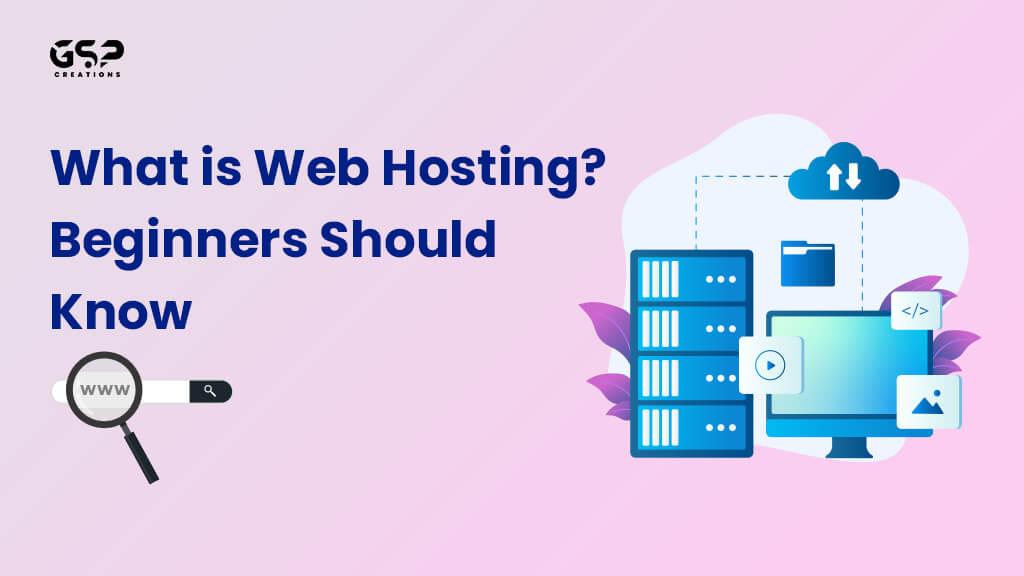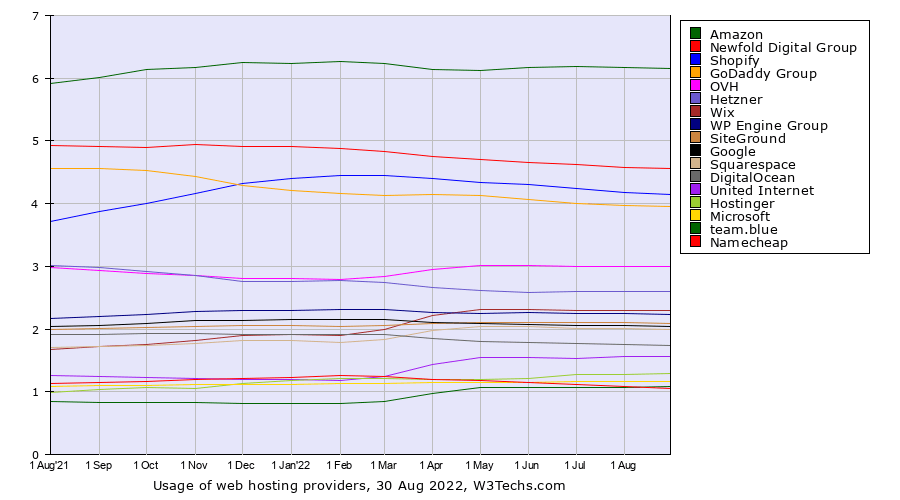Make Sure to Subscribe to Our Newsletter ✉️
Get the latest news and updates straight to your inbox.
Get the latest news and updates straight to your inbox.
Learn What is Web Hosting, Different Types of Hosting and the Best Web Hosting Service Provider for Your Business Website

Disclosure: Our content is reader-supported. This means we may receive a commission if you click some of our links. Learn More, why it's important and how you can support us.
Web hosting is a service that allows businesses and individuals to publish their websites or web pages on the Internet. A web host, also known as a web hosting service provider, is a company that offers the technology and services required for a website or webpage to be seen on the Internet. Websites are hosted or saved on specialised computers known as servers.
When Internet consumers wish to view your website, they simply type its address into their browser. After that, their computer will connect to your server, and your webpages will be transmitted to them via the browser. In order to host with most web hosting firms, you must own your domain name. If you do not already have a domain name, web hosting firms will assist you in obtaining one.
Hosting services are basically the rental of space on a web server. This is where your website’s files and databases are stored. A good hosting service will provide you with a Control Panel, which gives you access to your server and website files. They will also give you a hosting web service, which allows you to connect your domain name to your website.
The best web hosting providers will offer a wide range of services, including unlimited bandwidth, email accounts, and web server space. They will also provide you with a money-back guarantee so that you can try out their services risk-free.

A domain name provides the website’s digital identification, making it easy to find. After deciding where to store your website files, the next step is to do a domain name search and then purchase a domain name.
A domain name is often made up of a website name and a domain extension like .com, .org, or.net. There are also numerous alternatives and new domain names, such as .xyz, which are among the most popular today. A domain name and a hosting account can be obtained from the same or different vendors. Many hosting businesses, including Hostinger, also provide domain registration.
Once you’ve found a unique domain name, you should register it with a domain registrar. If you did not choose the same firm to host the site, purchase a hosting plan and point the domain name accordingly. Alternatively, purchasing a hosting service that includes free domain registration is a lot easier and less expensive option.
However, if you’re dissatisfied with the service, you can relocate the site to a different host. Just make sure the firm supports the foundation of your website.
There are different types of hosting for websites. Additionally, it might be difficult if you’ve viewed all the options that a Web hosting business offers. This is more true for newbies.
The best Web hosting for you will be determined by aspects such as the site’s purpose, traffic volume, and budget. Entry-level plans should be enough for a tiny blog. E-commerce sites benefit from more expensive plans.
Shared web hosting is the cheapest type of hosting and is ideal for sites with few requirements. One main disadvantage of shared hosting is that resources must be shared. A website on the same server as you receives a lot of traffic, and overloading the server can cause your site to slow down.
A server cannot host an unlimited number of websites – there are protections in place to prevent this, but it is still one of the slowest solutions due to shared resources. This form of hosting is ideal for new websites with little content.
This new range of hosting overcomes some of the shortcomings of standard Web servers. Your website is saved on numerous servers rather than one. When one server fails, the others will take over.
One benefit of cloud hosting is that you can scale up your virtual server resources as your traffic develops. This flexibility enables you to increase bandwidth as your online business grows gradually.
Virtual private servers are referred to as VPS hosting. When using VPS, one server works as a collection of distinct servers. You get a dedicated slice of shared server resources with VPS, so other sites on your server don’t affect your hosting.
VPS hosting is somewhat more expensive than shared web hosting, but you get greater resources and the ability to scale your website as your traffic grows. In other words, if you’re producing more visitors and your internet business is expanding, poor speed won’t be an issue.
You get access to the entire server while using dedicated hosting. There is no requirement to share resources. Thus, your website will constantly function at its peak level. You may install extremely complex programmes, scripts, and apps when you have total control over your server, which is not possible while using shared hosting.
One disadvantage is that you can experience problems managing and operating your server if you lack the necessary technical know-how. Either your website will experience downtime, or you will need to employ a professional to resolve the issue.
WordPress provides hosting and allows you to set up your website and domain on WordPress.com. However, this is a trimmed-down version of WordPress that does not allow you to install certain plugins, themes, or more in-depth settings required to build a fantastic website.
A shared WordPress account or a managed WordPress account are also options. Shared WordPress hosting functions similarly to traditional web hosting. However, with dedicated WordPress hosting, your web host can assist you with backend activities such as updating and securing your WordPress.

Website hosting can cost anywhere from free to paid options. Free web hosting is typically supported by advertisements placed on your website, while paid web hosting involves a monthly fee. Domain names can also cost money and are typically provided by a hosting provider or website hosting service.
Bandwidth and disk space are other factors affecting website hosting costs. Paid hosting services typically offer more bandwidth and disk space than free hosting services. Finally, server costs can also play a role in how much a website costs to host. Server costs can vary depending on the type of server used and the size of the server.
Note: All pricing information provided below is correct as of August 2022. All plans automatically renew at slightly increased rates. Here are our top picks for Web hosting in 2022:

Hostinger is my #1 recommendation if you seek a quick, economical, and dependable Web hosting company. Hostinger has a wide range of options to suit your needs. You have several options if you’re looking to host a website on a virtual private server (VPS). You can also register a domain name at the moment of signing up for a hosting web service. Both the most popular domain extensions and the new ones that have recently been released are supported by them. Compared to other domain name registrars, their costs are comparable. Only Above Premium plans include a free domain name with the purchase of a domain name.
or Check our Hostinger Review

Cloudways is a Web hosting company in Malta that has been operating since 2011. The firm focuses on offering excellent web hosting services to companies, developers, and individuals with the fundamental value of shared hosting made simple, quick, and convenient.
Cloudways’ cloud hosting solutions are focused on managed cloud hosting, managed WordPress hosting, and PHP app hosting (Drupal, Magento, Laravel, Prestashop, etc.). Cloudways does not offer shared web hosting.
Aside from a good cloud hosting environment, one clear strength of Cloudways is undoubtedly its affordability. The firm is less expensive than most other Managed Cloud Hosting providers, starting at $10 per month.
Note: The various pricing levels correspond to more RAM, processor/vCPU, storage, and bandwidth limitations. And also, there are many more plans available in Cloudways. Offsite backup storage will be charged at $0.033/GB per server.
or Check our Cloudways Review and (Start Free Trial Now)
Creating a New website requires a lot of decision-making, including how and where to host it. Whether you’re starting an online business, a blog, or another form of the website, the first step is to sign up for a hosting account. Web hosting is a service that allows your website to be accessible via the Internet.
Understanding the fundamentals of web hosting and the many types of web hosting services can assist you in locating a cost-effective and dependable option for your website.
When evaluating various services and hosting providers, keep your needs in mind and examine the benefits and drawbacks of web hosting firms.
Video Editing, Web Designing & Motion Graphics Intro, etc...
Join our subscriber’s list to get the latest news, updates directly in your inbox.